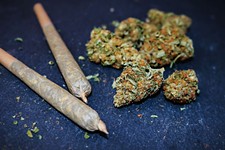Teen Pot Use on the Rise?
Partnership for a Drug-Free America says more teens are using party drugs
By Jordan Smith, 3:44PM, Wed. Mar. 3, 2010

Overall, teen use remained stable in 2009, but use of the three most common party substances is on the rise, reports the Partnership for a Drug-Free America.
The Partnership says there is "cause for concern" that decreases in teen drug use and acceptance, measured in self-report surveys by the Partnership/MetLife Foundation Attitude Tracking Studies, turned around last year. In fact, according to the so-called PATS survey, among high school kids there have been "upswings in substances that teens are most likely to encounter in social situations" – that is, alcohol, pot, and ecstasy.
According to the survey, teen past-month use of alcohol in 2009 was 39%, up four percent from the previous year, and the first increase since the high measure of 50% in 1998. The same goes for lifetime use of pot and past-month pot use: last year 44% of teens said they'd tried pot at least once, while 25% said they'd used dope within the last month. Those numbers had also been on the decline, hitting their lowest points in 2008, with 39% lifetime pot use and 19% past-month use, according to the PATS. And past-month use of ecstasy, which had remained fairly steady from 1998-2008, at around 4%, spiked to roughly 6% use in 2009. (Meanwhile, the use of over-the-counter cough meds and prescription meds, as well as use of cocaine, heroin, LSD, meth, and steroids, have all remained steady or have declined, according to the PATS.)
To make matters worse, according to the PATS, teens have posted "significant decreases" in a "wide variety of risk perceptions in using marijuana" – that is, their fears of upsetting parents, letting other people down, of "becoming lazy," "getting depressed," and of "putting themselves or others in danger" (among other risk perceptions) have all declined. For example, the percentage of teens who said there would be a "great risk" of putting themselves or others in danger if they use pot declined from a high of 68% in 2008 down to 60% last year.
Among the reasons for the increases in use and declines in feeling that bad things may result from using drugs is a shift in the sources from which teens are getting information about drugs. Fewer teens say they're getting information from schools and parents, while more teens say they get drug information from the Internet and from "websites like YouTube" – in 2009, for the first time, 17% of kids said they got drug info from YouTube.
This is all problematic to keeping drug-free kids and families, according to the Partnership report: "The 'softening' of anti-drug attitudes and an increase in substances...that are used in teen social situations are a bellwether for a serious health problem for American families." Parents need to be involved in their children's lives and let them know that drug use is a no-no.
Reefer Madness, couldn't agree more. But, given that nothing substantial has changed in the nation's War on Drugs that might actually account for the rise in use among teens, the question remains: Is there any strategy that might actually successfully reduce drug use among teens?
According to the Marijuana Policy Project, it is prohibition that does the most damage: "These latest numbers show that our current marijuana policies – which keep marijuana unregulated and in the hands of drug dealers – are clearly not working to help reduce teen use," said Kurt Gardinier, MPP's director of communications. If pot were taxed and regulated (as is being proposed in California), then licensed merchants would be required to check IDs, and it would be less likely that kids would end up with dope. "That's why cigarette smoking among teens has continued to drop since the early 90s, while teen marijuana use has not," he said. According to a December 2009 report from the National Institute on Drug Abuse, cigarette use by teens continues to drop: last year just 11.2% of high school seniors reported smoking cigarettes, down from nearly 25% in 1997. Regulation and taxation works. Indeed, "[d]rug dealers do not check IDs," said Gardinier.
Got something to say on the subject? Send a letter to the editor.
A note to readers: Bold and uncensored, The Austin Chronicle has been Austin’s independent news source for over 40 years, expressing the community’s political and environmental concerns and supporting its active cultural scene. Now more than ever, we need your support to continue supplying Austin with independent, free press. If real news is important to you, please consider making a donation of $5, $10 or whatever you can afford, to help keep our journalism on stands.
Kevin Curtin, April 20, 2021
Austin Sanders, July 2, 2020
Jordan Smith, April 1, 2014
Jordan Smith, Jan. 31, 2014
May 22, 2014
Reefer Madness, PATS, MPP, marijuana, war on drugs












